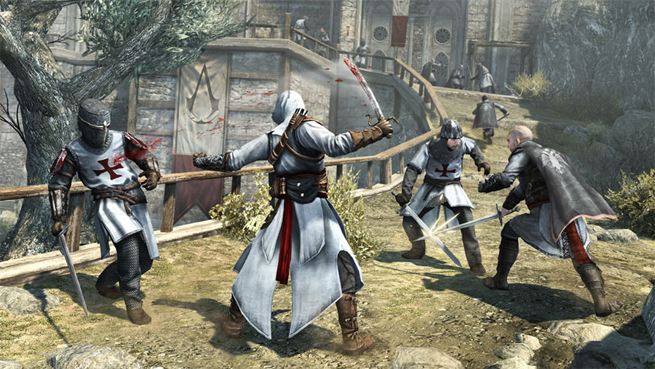 Many newer-generation video games equate religion with violence, finds a new study from the University of Missouri.
Many newer-generation video games equate religion with violence, finds a new study from the University of Missouri.
Greg Perreault, a doctoral student in the university’s School of Journalism, recently examined five titles that incorporate spiritual themes in their storylines — Mass Effect 2, Final Fantasy XIII, Assassin’s Creed, Castlevania: Lords of Shadow, and The Elder Scrolls IV: Oblivion. He found that each game “problematized religion” by closely tying it to violence.
“In most of these games there was a heavy emphasis on a ‘Knights Templar’ and crusader motifs,” he said. “Not only was the violent side of religion emphasized, but in each of these games religion created a problem that the main character must overcome, whether it is a direct confrontation with religious zealots or being haunted by religious guilt.”
 Perreault (pictured) tells VentureBeat his study did not originally focus on violence. “In general, I tend to think that studies of violence in video games are passe. I set out interested in the depictions of organized religions versus spiritual religions, expecting to find organized religions depicted far more poorly than spiritual [ones].”
Perreault (pictured) tells VentureBeat his study did not originally focus on violence. “In general, I tend to think that studies of violence in video games are passe. I set out interested in the depictions of organized religions versus spiritual religions, expecting to find organized religions depicted far more poorly than spiritual [ones].”
However, he says a game that connects religion with violence isn’t necessarily portraying it negatively. He uses the character Thane in Mass Effect 2 as an example, a deeply spiritual assassin who joins in the player’s quest to save the galaxy from the Reapers. “This is an interesting case because his religion doesn’t ‘inform’ the violence, although it allows for it,” he said. “His religion basically says that the body and soul are separate. So the body can be used as a tool by someone else, and thus his assassinations aren’t anything he bears guilt for — the person who hired him bears the guilt. But Thane still feels guilty. He thinks about his victims, he prays for his victims. So is the religion violent here? Not necessarily, although it allows for the violence he commits — and must commit — in order to save the galaxy.”
While he cites Mass Effect 2 as an example of a game that portrays its spiritual themes in a positive light, Perrault says Assassin’s Creed is the most critical title he researched. “The game revolves around the search for something called the Piece of Eden. It allows you to control people’s minds. The argument is that the parting of the Red Sea, the turning of water into wine, the Resurrection — all of it was courtesy of church leaders who used the Piece of Eden to convince people a miracle occurred. The Templars, who appear to be exactly what they’re called, want it so they can use it to control the people. The Assassins, who are depicted as Enlightenment era secularists, want to keep it from them. As it turns out in the end, the Assassins don’t have good intentions with this thing either.”
Aware of the problems it could cause, Ubisoft puts a disclaimer on each Assassin’s Creed title saying that the game was designed by a “multicultural team.”
While the study observed a relationship between violence and video games, Perreault says he does not believe developers are creating an intentional commentary on religion.
“It doesn’t appear that game developers are trying to purposefully bash organized religion in these games. I believe they are only using religion to create stimulating plot points in their storylines. If you look at video games across the board, most of them involve violence in some fashion because violence is conflict and conflict is exciting. Religion appears to get tied in with violence because that makes for a compelling narrative.”
“I hope [the developers] take away that the thoughtful writing and imagery of their games doesn’t go unnoticed,” he added. “I hope this propels great writing into all the great conversations of our society in video games, which I think ultimately will lead to better and better games.”
Perreault presented his findings at the Center for Media Religion and Culture Conference on Digital Religion.
VentureBeat's mission is to be a digital town square for technical decision-makers to gain knowledge about transformative enterprise technology and transact. Learn More
